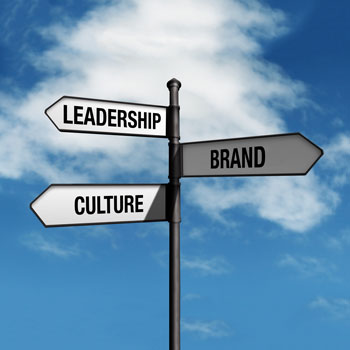By Judith E. Glaser & Jon Entine | huffingtonpost.com
Published: July 7, 2014

Innovating to last in the new reality
What is all this talk about sustainability? Is this serious business or another fad or trend that has little relevance to business? As part of our Conversational Intelligence Research, we often explore the evolutionary definitions of words that are changing the world and opening up new conversations. Our "phrase of the month" is Sustainable Leadership.
The corporate world is abuzz with sustainability. Leaders are under duress, facing the most serious financial and structural challenges in decades. Fear and anxiety are rampant, which heightens the concerns of stakeholders. Instilling an ethic of sustainable management signals to investors, employees, vendors, and customers that a business is stable and the leadership has a long-term vision drawing on state-of-the-art practices. The ethic extends beyond environmental concerns and embraces a new, vigorous business model that acknowledges the interdependence of all stakeholders.
Productivity plummets when stake-holders are worried more about security than executing responsibilities and responding to opportunities. Building confidence is key. Attracting and retaining top talent is critical to creating a sustainable business model; and commitment to socially responsible behaviors helps ensure satisfaction and loyalty. In a "flat" world, the leader's ability to engage is the key driver of sustainable success.
Engage in the Conversation
Most organizations are matrixed with communication flowing multi-directionally. We no longer sell to customers; rather, we build partnership with them for sustainable success. But engagement needs to extend beyond the customer to all stakeholders: how they think, what is important to them, and how to partner with them to focus on the critical issues: financial, social and environmental. Customers, vendors, regulators, the media, and other stakeholders, including shareholders demand higher transparency.
Leaders stand at the intersection of leadership/culture/and brand. They need to be trained to lead stakeholders and not just respond to crises, having one foot in the investor world and the other deep inside their culture to manage the triple-bottom line, which means overseeing so-called "soft" concerns such as social issues as well as traditional financial issues. Yet there is often an initial resistance in "alpha cultures" to the concept of sustainability. It is sometimes mistakenly viewed as social engineering or as too ideological, and is marginalized in the minds of hard-driving executives and entrepreneurs. Yet sustainability lowers risk profiles and increases opportunity. But the key is whether the leaders have the fortitude to break through the resistance, instill stakeholders with a vision of stability and revival, and aggressively manage the financial health.
Where to Start: The Discovery Process
To increase their Sustainability IQ, leaders need to initiate a sustainability conversation and gather information about key aspects of the business and culture. They need to address what sustainability means to an organization in the context of its vision, goals, structure, initiatives and performance. Various metric standards are available to summarize the data. The Discovery Process begins building a new foundation that enables conversations about what's important for sustainable success as it creates a template to understand transparency, engagement, and a shared view of reality. Leaders can use this information to learn more about themselves, their culture, obstacles to change, and the roadblocks that limit engaging with all stakeholders.
Step 1: Create the Discovery Guide.
The Discovery Process begins with building the Discovery Guide -- a set of provocative questions that open the organization to a new way of thinking about how to create sustainable leadership and change. Each question set has sub questions that provoke deep dives into issues and opportunities, launch the sustainability conversation, and make the business case for sustainability.
Step 2: Establish the Discovery Interview Protocol. When conducting interviews, choose the appropriate people to bring insight, candor, depth and breadth to the process. Those interviewed begin to understand whether their views of the organization are aligned with its performance and the perceptions of others. They ask questions such as: "Are you finding what I say consistent with what others are saying?" This builds the sustainability conversation and commitment to the processes and initiatives.
Step 3: Facilitate an Executive Briefing and Brainstorming Session. Executive Briefing sessions provide a time for leaders to sit face-to-face with each other, and with others who report to them to interpret needs, discuss strategies, and develop sustainability objectives. The process creates aware- ness, alignment, and understanding at all levels. The leaders frame of reference moves from an "I-centric orientation" to a "We-centric orientation."
Knowledge is Power
Sustainability and Global Citizenship can be "organizing principles" that unlock the hidden value of a company -- sustainable long-term value -- in an increasingly competitive international landscape strewn with regulatory and reputational challenges.
Sustainable innovations transform operations, culture, and leaders. They impact the quality of products and services and improve operational efficiency, customer loyalty, and recruitment efforts. Environmental, Social, and Governance (ESG) initiatives are only possible when stakeholders collaborate to challenge old paradigms and improve the processes and practices that shape the wellbeing of the organization, the community, and environment.
These initiatives are good for people and for business, particularly in challenging times when markets are in turmoil and employees are on edge. As leaders engage stakeholders, they elevate enterprise thinking. Companies that incorporate sustainability and responsibility into the DNA of their culture distinguish themselves and become leaders in their industries.
Jon Entine is founder of ESG Metrics, columnist on sustain-ability, visiting fellow at the American Enterprise Institute, a frequent contributor to Forbes.com, and member of the Creating WE Institute. He is the author of seven books including Taboo and Abraham's Children.
Judith E. Glaser is CEO of Benchmark Communications, Inc. and Chairman of The Creating WE Institute, and author of seven books. Her newest best seller is Conversational Intelligence: How Great Leaders Build Trust and Get Extraordinary Results (Bibliomotion, 2013) Visit http://www.conversationalintelligence.com
ACTION: Lead for sustainability.








